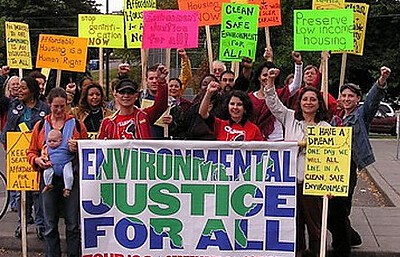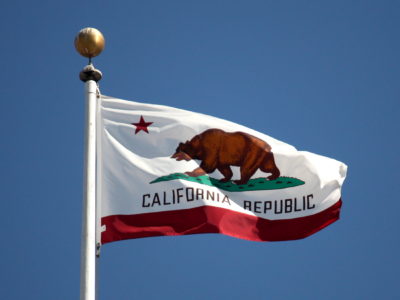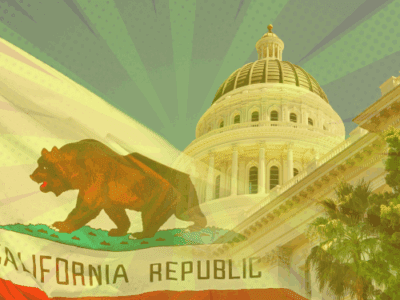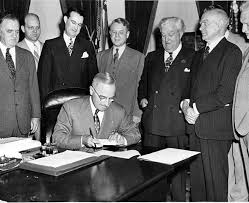Can Public Ownership Fix Our Electricity Woes? It’s Complicated
New UCLA report "Power Struggle: California's Electric Utility Ownership Dilemma" by Sylvie Ashford, Mohit Chhabra, and Ruthie Lazenby
This post is co-authored by Sylvie Ashford and Mohit Chhabra. California’s investor-owned utilities (IOUs) are under intense scrutiny for causing deadly wildfires and charging some of the nation’s highest electricity rates. Adding to these challenges, IOUs are required to make significant clean energy and grid investments to achieve the state’s goal of a net zero carbon economy by 2045, while keeping electricity affordable and reliable. These big asks are of...
CONTINUE READINGImmigration Raids are an Attack on Climate
The Drain is a weekly roundup of environmental and climate news from Legal Planet.
It’s hard to watch the Trump administration test drive authoritarianism in California. Since the inauguration, I’ve found solace in slowly rewatching The West Wing, a good bedtime story for anyone who feels nostalgia for partisan politics of yesteryear. Anyone else doing this? It’s uncanny how my rewatching has lined up with real world events. In April when Sen. Cory Booker gave his 25-hour speech on the floor, I watched the episode in which a fictional S...
CONTINUE READINGThe Annihilation of Environmental Justice: A Timeline
Trump has spared no effort to ensure that the government ignores the needs of vulnerable communities.
There has been a systematic war of elimination against protections for vulnerable communities. This includes not only any protections for minority communities, but also those for poor communities, minority or white. While initiated by Trump, the effort has included a ream of destructive follow-on actions. The best way to make the point is a chronological account. Jan. 20. A “Day One” executive order directs agencies to terminate all environmental justice offic...
CONTINUE READINGReclaiming Science, Democracy, and American Values
In This Moment, What Do We Say to Young People?
Like many in academia, I work and interact daily with people in their 20s. Unsurprisingly, they, as a group, are now confronting feelings of fear, uncertainty, anger, and displacement, embarking into a new reality. Long held American values are under vicious attack. Their future is at stake. So what should we counsel? Whether you believe in American Exceptionalism (that the United States is unique, distinct, or exemplary compared to other nations) or not, it i...
CONTINUE READINGLast Year’s Climate Bond May Not Be What You Thought
While investing in important adaptation and resilience measures, Proposition 4 does less to create new clean energy infrastructure investments
Last year, legislators passed, the governor signed, and California voters approved, a ten billion dollar climate bond (the Safe Drinking Water, Wildfire Prevention, Drought Preparedness, and Clean Air Bond Act of 2024, SB 867 (Allen), which appeared on the November ballot as Proposition 4). While the bond act’s full title largely tells the story of its contents, the water- and resilience-focused spending may not be what all Californians expected from the state’s firs...
CONTINUE READING(In?)sane With the Membrane
New developments in Deep Sea Desalination hold important promise for the freshwater crisis - and might require an amendment to Clarke's Third Law.
The great speculative fiction writer Arthur C. Clarke’s Third Law reads: “Any sufficiently advanced technology is indistinguishable from magic.” This principle came to me the other day when considering this interesting Wall Street Journal piece on Deep Sea Desalination (which we can call DSD for short). Virtually alone among environmental law professors, I am a desalination booster (which I explain below). The idea behind DSD is to place desalination machine...
CONTINUE READINGThe California Legislature Halftime Report
In a year defined by affordability and climate crises, several bills aimed to alleviate pressures on both fronts are advancing in the Legislature.
Thank you for joining me for the California Legislature Halftime Report, it is an exciting time of change with many updates to share. A new Senate President pro Tempore was just selected. I’m pleased to share that it is Senator Monique Limón (District 21), who I am personally pleased about this because she is my representative and she has done a remarkable job for our community and our state, but most importantly for this post, it is wonderful news because Senator Lim...
CONTINUE READINGThe Most Important Law Most People Have Never Heard Of
Here’s how the APA bolsters the rule of law and protects the environment.
Seventy-nine years ago, President Harry Truman signed a law that, to this day, most Americans have never heard of. Even the title of the law — the Administrative Procedure Act or APA — is a guaranteed yawner. Yet this law is central to the rule of law and, among other things, to environmental protection. We are learning from the current Administration’s efforts to evade the APA just how important it is. Administrative procedure is a complicated subject that ...
CONTINUE READINGWhy Do Heat Pumps Have a Bad Rap? Lies
The Drain is a weekly roundup of environmental and climate news from Legal Planet.
I just listened to dozens of people tell me that heat pumps don’t work, may cause homelessness, and can bankrupt small businesses. This was shocking news to me, in no small part because I’m currently in the process of installing a heat pump in my condo. Obviously, I don’t want to waste money, sleep on the street, or see my local bakery go belly up. Should I call up my contractor and tell him we are sticking with our 1960s gas furnace? No, of course not. This...
CONTINUE READINGCan Trump Save U.S. Coal? Not likely.
“Beautiful clean coal”, as Trump calls it, is inexorably declining.
On May 23, the Trump Administration issued an emergency order to keep a coal-fired power plant open, even though the owner and the state utility commission both wanted to close it. That’s in line with Administration policy. The title of one of Trump’s executive orders is “Reinvigorating America’s Beautiful Clean Coal Industry.” That order says, “it is the policy of the United States that coal is essential to our national and economic security.” But Trum...
CONTINUE READING












